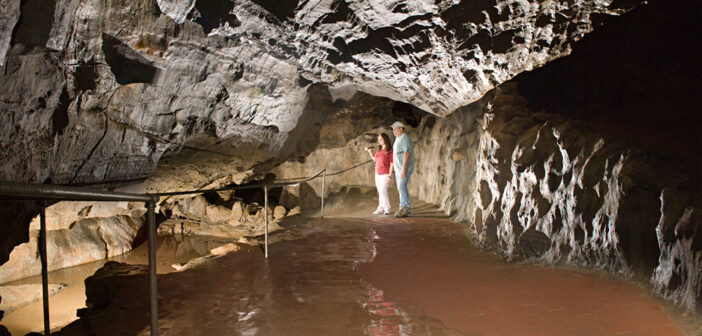Several tourist attractions in the Lehigh Valley are open and adapting to new conditions brought on by COVID-19.
Lost River Caverns, ArtsQuest and the National Museum of Industrial History were closed from March until June due to the pandemic. This caused major disruptions to business and decreases in revenue.
Robert Gilman, owner of Lost River Caverns in Hellertown, said the limestone cave usually gets a lot of visitors through summer camps and school field trips, but due to the cancellation of summer camps and the switch to remote learning, visitorship hasn’t been the same.
Gilman said there is concern about business in the spring as well. Because many Lehigh Valley students are learning remotely now, they will have to catch up in the second half of the school year. Even if schools run in person this spring, Gilman believes teachers won’t feel they have enough time to schedule field trips.
Still, Gilman said local residents are in search of activities to do during this time.
“I think we’ve seen a fair demand because people are getting a little stir crazy from being cooped up for so long,” Gilman said. “There aren’t a lot of things they can do.”
Curt Mosel, chief operating officer at ArtsQuest, said they are struggling. ArtsQuest’s annual budget is about $23 million, however, he estimates its revenue this year will be about between $4 million and $5 million.
“We’re being impacted significantly,” Mosel said.
Musikfest, the annual music festival hosted by ArtsQuest, usually brings in anywhere from one million to 1.2 million people over the course of 10 days, but was held virtually this year.
While limitations on capacity and social distancing guidelines have disrupted many of the usual events ArtsQuest offers, the non-profit organization has found other ways to get the community involved.
Mosel said ArtsQuest hosted virtual art classes, broadcasted concerts on Service Electric Cable TV and streamed concerts online. They also had some in-person programming for Musikfest with outdoor dining and invited vendors who sold food to-go.
Currently, ArtsQuest will be holding the annual Christkindlmarkt six weeks early. The market opened on Oct. 8 and will run through Thanksgiving in order to take advantage of the warmer weather.
In the near future, ArtsQuest hopes to continue many of its traditions and introduce some new ones.
“We hope to be able to offer indoor dining with music on the newly renovated first floor of the ArtsQuest center,” Mosel said. “We hope to continue to try to do some things with movies. We are looking at how we can do dining in the Musikfest Cafe with live music up there where we normally do about 100 ticketed concerts a year.”
For the National Museum of Industrial History, demand has been “hit or miss,” said Glenn Koehler, director of Marketing and Public Relations.
“In general, we don’t have a visitorship that really packs the museum unless we’re holding a speaker program or something like that,” Koehler said.
However, Koehler said Steel Weekend, the museum’s annual celebration of Steel Day, which took place Sept. 28 and 29 this year, was successful in terms of turnout.
As of now, the museum is running on shortened hours to allow for extra cleaning time. Masks are mandatory, social distancing between different parties is enforced and hand sanitizing stations and plexiglass barriers have been installed. Visitors can also buy tickets online now and have them scanned from their phones.
“I’m sure everyone’s sick of the term ‘new normal,’” Koehler said. “But we’ve eased into it. We’ve slowly gotten back to sort of normal.”
When Koehler first heard COVID-19 might shut down businesses, he got to work on virtual lectures.
Koehler immediately started reaching out to speakers he believed would interest the museum’s target audience on topics like engineering and industry. The museum was able to start online lectures within a few days.
“One of our first talks was actually a Lehigh grad,” Koehler said. “He did a talk about how Bethlehem Steel handled the 1918 flu pandemic. As a result of what the company did for the town, Bethlehem had one of the lowest mortality rates in the world.”
The museum also added virtual youth programs and a 3-D tour of the museum online for those uncomfortable with coming in-person. In total, the museum programmed over 30 hours of original content, and people are interacting with these online programs from all over the world.
Currently, the museum is working on opening its outdoor park, which will contain artifacts from Homer Research Laboratories, once the largest steel testing laboratory in the world, located at what is now Lehigh’s Mountaintop Campus.
The National Museum of Industrial History has also welcomed some of its staff back in limited capacity. Most of the employees are working from home, but the front desk is being managed in-person, gallery guides have returned and some behind-the-scenes jobs are being done in-person as well.
Welcoming staff back when reopening was a little different for Lost River Caverns. Gilman said there were staff members who were hesitant to come back to work out of concern for their health and safety. He said, however, this has not posed any problems.
With so much uncertainty, however, there remains a sense of optimism.
Mosel does not believe the pandemic has changed the spirit of Bethlehem. He believes the area rallied around itself before in the early 1980s when Bethlehem Steel was in decline.
“I think the Lehigh Valley is incredibly resilient and very supportive of each other in every way,” Mosel said. “It can be and will be a big reason that, when we come out of this, a lot of businesses will survive and will continue to be supported. People are stepping up.”






Comment policy
Comments posted to The Brown and White website are reviewed by a moderator before being approved. Incendiary speech or harassing language, including comments targeted at individuals, may be deemed unacceptable and not published. Spam and other soliciting will also be declined.
The Brown and White also reserves the right to not publish entirely anonymous comments.